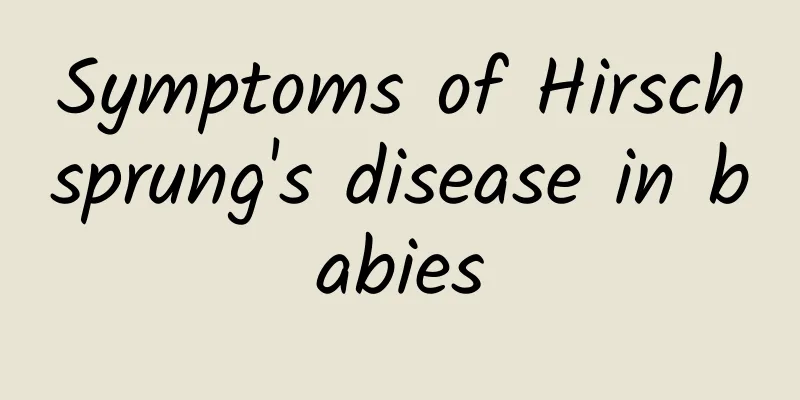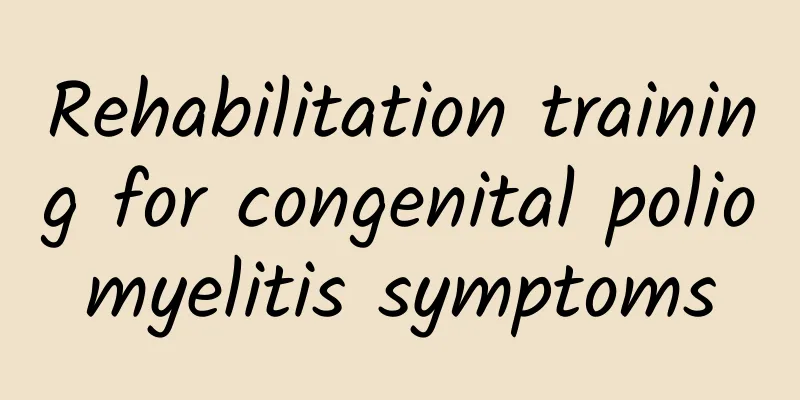Symptoms of Hirschsprung's disease in babies

|
Parents should pay close attention to the symptoms of Hirschsprung's disease in their babies and seek medical attention in time if they find any abnormalities. Hirschsprung's disease usually presents as symptoms of intestinal obstruction in the neonatal period or infant period, such as long-term constipation, abdominal distension and vomiting. Early detection and treatment are crucial to the baby's health. 1. Constipation and difficulty in defecation Babies with Hirschsprung's disease often have difficulty defecating from birth. Since the end of the intestine cannot relax and contract normally, feces remain in the intestine and cause severe constipation. Parents should carefully observe the baby's defecation, especially if the baby does not defecate smoothly in the first few days after birth, and seek medical attention in time. 2. Abdominal bloating and vomiting Bloating is caused by excessive accumulation of gas and stool in the intestines, which may be accompanied by abdominal discomfort and pain. Difficulty in passing stools can prevent food and liquids from passing smoothly through the intestines and can also lead to vomiting. For infants and toddlers who do not yet have the ability to speak, frequent crying and rubbing of the abdomen may indicate discomfort. 3. Loss of appetite and lack of weight gain Due to poor digestive function, babies with Hirschsprung's disease may show a loss of appetite, which is accompanied by stagnant or reduced weight gain. If the baby does not gain weight during breastfeeding, parents should pay attention. If you suspect your baby has similar symptoms, you should take him to a professional pediatrician for diagnosis and treatment as soon as possible. Usually, the treatment of congenital megacolon includes medication, dietary adjustments, and surgical treatment when necessary. Mild laxatives may be used to relieve symptoms. In severe cases, surgical removal of the intestinal segment that cannot function normally is one of the final solutions to the problem. Surgeries such as intestinal decompression and large bowel resection and plasty can effectively improve the baby's symptoms in many cases. Early identification and treatment are key to managing your baby's Hirschsprung's disease symptoms. Closely monitor your baby's health and consult with a healthcare professional to ensure the most appropriate care and treatment for your baby. Prompt treatment can not only improve your baby's quality of life, but also prevent more serious complications. |
>>: Children with pneumonia have hoarse throats
Recommend
Causes of recurrent neonatal jaundice
The cause of recurrent neonatal jaundice may be r...
What is the cause of recurrent neonatal jaundice?
Recurrent neonatal jaundice may be related to a v...
What are the symptoms of hand, foot and mouth disease in adults?
Symptoms of hand, foot and mouth disease in adult...
What to do if your baby has a cough and runny nose? What are the treatment methods for your baby's cough and runny nose?
When a baby has a cough and runny nose, the follo...
What are the common causes of indigestion in children? What should be paid attention to in preventing indigestion in children?
Infant indigestion refers to symptoms of digestiv...
How to check for allergic rhinitis when your baby coughs
The baby's cough can be diagnosed with allerg...
Is it difficult to cure diarrhea in children?
Experts tell us that pediatric diarrhea means tha...
How to cure patent ductus arteriosus in newborns?
Patent ductus arteriosus is a congenital heart di...
What is Kernicterus
Kernicterus is actually a severe form of neonatal...
Are children's cough patches useful? Are children's cough patches really effective?
Parents will be anxious when their children show ...
What is the reason for the child's cough and how to treat it
If a child's cough does not go away, it may b...
What fruits can help adults with hand, foot and mouth disease recover faster?
Adults who have suffered from hand, foot and mout...
Can poppy paste treat diarrhea in children? The secret of effective medicine for treating diarrhea in children
Diarrhea is a common problem in children. Since t...
Know these causes of pneumonia in children? This will effectively prevent the occurrence of pneumonia
Pediatric pneumonia can affect children's hea...
The harm of ADHD to children's healthy growth
According to relevant data surveys, a foreign stu...









